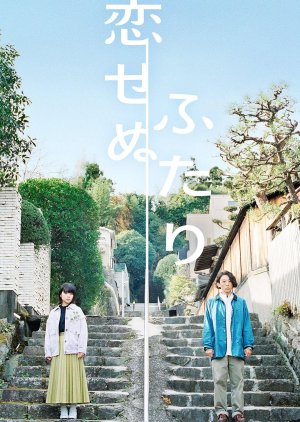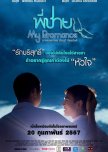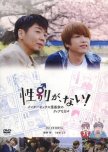
Revolutionary
I can't even put into words the importance of this drama not only to me as an aroace person but as a whole. I have never in main stream media seen an aroace character let alone two aroace characters explored and developed in such a beautiful and caring way. I could go into extensive detail on why this drama and representation is so important but the review would incredibly long so I'll try and keep it as short and sweet as possible.The issues and also the joy in finding your aroace identity and living as an aroace in such an amatonormative world was explored so well in this drama. The exploration of Takahashi touch aversion has left me speechless, the way they handled it with such care. I've never seen touch aversion explored in the way that Koisenu Futari did and I think it will stay with me forever. One particular scene, which I won't go into detail due to spoilers, left such a massive impression on me and I think that's thanks to Takahashi Issei's portrayal and acting within the scene.
Everyone behind this drama went into it with such care and they handled everything so beautifully. You can tell that with how they explore even the hardest parts of finding and accepting your indentity and the reactions of those closest to you. It was hard to watch at times but it was necessary to see because so many aroaces experience the things that we see both Sakuko and Takahashi go through or even fear that they will go through that. So to see the hardest parts shown the way that Koisenu Futari showed us makes you realise that you're not so alone in your experiences and fears as you think you are.
What I loved about this drama the most was how I could see my own story reflected in both Sakuko and Takahashi depending on where in my aroace journey I was. I'm so grateful that this drama exists. Thank you to the writers, to the actors, to the producers, to everyone behind this drama for giving us this drama, for wanting to explore such an unrepresented identity and to do it with such love and care. This drama will stay with me forever.
Vond je deze recentie nuttig?

so peaceful
Peace really is what I felt while watching Koisenu Futari. It's like watching your best and happiest dream unfold on repeat, just full of warm and contented feelings. One of the special people in my life is an aroace. She's a remarkable woman, gifted and strong, but also lonely and often feels misunderstood. I feel like I understand her a little bit better now after watching this drama. And while Issei Takahashi was the originating reason why I found Koisenu Futari, the theme is what made me determined to watch it.Don't we all want to live our best and happiest life? And what does that look like for each of us individually?
That's the question that both Takahashi-san and Sakuko have to answer for themselves. Takahashi always gave of himself to fulfill the expectations of his grandmother and of society. He lived in the same, in the now, and he never let himself think his life could be any different. He blessed Sakuko so much, freeing her to be her true self, teaching her that it's okay for her to be different no matter what anyone else said. And she returns that favor to him tenfold by helping him discover just who he wants to be and what he wants to do and equipping him to follow that dream.
Everyone goes into dramas with preconceived ideas of what it will be like. This drama was none of my preconceived ideas. I'd even settled on disliking Kazu-kun because he just seemed like someone who would annoy me. When in fact he also became such an integral part of Takahashi and Sakuko's development, and he grew and changed so much through the course of the drama. I didn't like Sakuko's sister, until I suddenly did. I thought some elements would end up being tropes and they weren't. And of course, the ultimate fear that the story would devolve into a love story, which it never did.
Koisenu Futari is perfect. Its value is so far-reaching and I hope it gains more traction and viewers. Thanks to Kaizen Subs for their hard work. Many thanks to the brilliant performances of Issei Takahashi and Yukino Kishii. The more I learn of Takahashi-san's filmography, the more I love him. He doesn't settle for the norm, but stretches boundaries. If you want another equally magnificent drama starring him, try Bokura wa Kiseki de Dekite Iru. Another hands' down favorite, only this time he plays a man who I believe is on the autism spectrum.
Vond je deze recentie nuttig?

dollopheadsandclotpoles
20 mensen vonden deze beoordeling nuttig
A stunning representation of what it is like to be aroace
The only time I've ever gotten aroace representation in the past is from books and generally the stories I've read involve teenagers discovering they are aroace, struggling with it and finally accepting it. Generally, the book ends on a nice, hopeful note about the future. I love those stories, I love that they exist and I believe they are colossally important. But Koisenu Futari gave me something those books didn't - it showed me what a future could look like for an aroace person like me. The show is the story of being an adult and navigating the world AFTER identifying as aroace, and that is something I have never seen before in any medium ever.As someone who only really accepted my aroace identity in my 20's, to see a character around the same age as me going through the emotions and conflicts I have been through myself was just... incredible. I've been burned a lot in the past, and I cannot deny that throughout the show a part of me was panicking, worried to death that they would shoe-horn a romance in there. But now that the show is over I can safely say that this is one of the most beautiful, incredibly important shows I've ever seen. It handled aromanticism and asexuality in such a realistic, sensitive and wonderful way and made me cry about five times with the way it touched on various issues. Every thing from the ups and the downs were so real and so raw, and as someone who has experienced so much of what they have experienced, this show touched me in a way that's hard to explain.
I honestly never thought I'd see a show any time soon with an aroace protagonist, let alone TWO such different ones. I could go on and on about the show, but for the sake of keeping this review short, I just want to say that this is a fantastic show, an important show and a thoroughly well researched show and I'm so grateful that it was made ❤
Vond je deze recentie nuttig?

An Emotionally Profound Seesaw of Aro/Ace Reality and Dreams
Despite what the previews for each episode tries to tell you, this drama was consistently a low-angst but emotionally profound story. And I'm unbelievably happy about the attention it's gotten since its release. Kodama and Takahashi are such well-written and well-performed examples of aroace individuals.It was a bit odd though. Because it was a tenuous seesaw between the reality of being aro/ace in a society that doesn't understand how that could possibly exist, and the optimistic dream of all aro/ace individuals of being surrounded by people who seek to understand and will accept you even if they can't. And in the effort to create this aro/ace dream from the reflections of reality, some actions were unreasonably forgotten as the story went on. And it left me, as a viewer, feeling guilty for not being able to move past these small offenses and worrisome transgressions as easily as our leads did.
But at the end of the day, all these encounters served as meaningful lessons in what aro/ace individuals are expected/asked of daily and how those expectations weigh us down and creates an unintentional force that alienates us and invalidates our feelings. And their resolutions speak to what family is supposed to be about, and the different ways familial and other societal bonds manifest.
And I absolutely love how well everything was communicated between the characters. On the surface, Kodama (a highly sociable and energetic extrovert) and Takahashi (a guarded and reserved introvert who's only really enthusiastic about food and plants) shouldn't get along. Especially by allo standards of lacking sexual and romantic attraction. But yet they do. Bonded by their shared experiences as alloace adults and resultant loneliness, they create such an adorable platonic family. It was quite awkward and rocky for quite a while as it formed, as it naturally would, but left me gushing over their small but meaningful moments of comradery. It leaves me hopeful.
I love how this drama progressed from Kodama just looking for answers online to an overall story about being aroace as working and independent adults. And how being aroace doesn't mean you don't want to have a life with someone. And the way that this drama addresses that being aro/ace is a spectrum with a lot of things to consider was just so fantastically done.
The writing, performances, and representation had me on the verge of tears on more than a handful of occassions.
Vond je deze recentie nuttig?
Deeply touching story about platonic love
There are some stories that stay with you, and this one is certainly one of them for me. Even while watching it, I felt a sense of sadness that it would end so soon. I would have happily watched another 100 episodes, but sadly everything good must come to an end.These characters became so precious to me in such a short amount of time, and it genuinely hurts that I won’t get see more of their story. I don’t remember the last time a drama touched me so deeply, and I really really hope that it will become more easily available for international audiences one day.
I was not expecting the aroace representation to be as good as it was. I was willing to look past some imperfect ideas of aromaticism and asexuality, and just be happy to finally see some representation, but the writer did an amazing job with this one, and it truly feels like a drama made with love towards people on the aromantic and asexual spectrum. I could not have been happier with how they portrayed these characters. I found myself crying many times while watching it, not because it was sad but because I felt so seen in a way I have never felt before.
I tend to get bored easily with these more slow paced slice of life dramas, but not with this one. The pacing was perfect, and I never felt that time was being wasted on unnecessary filling. I think this is a story that will make a lot of people think about their own lives, and what love means to them. I wish they would have talked more about platonic love, and how it can be just as important as romantic love, but I feel like they showed it beautifully.
Vond je deze recentie nuttig?

Came to learn about aromatic/asexual people, learned much more...
As said in the headline I wanted to watch that drama to learn about aromatic/asexual people...in the end I even learned much more about myself, whatever sexual or non-sexual orientation or any relationship behaviour and about dreams and desires in life in general. They covered so much in little time of that drama in a decent way, it's quite amazing.The cast and plot was very good, my only minor complaint is the character Matsuoka Kazu. The way he went from one extreme to the other I didn't find plausible and more like a construct to make the plot more pleasant.
It's a very good rewatch I'd guess, as there are a lot of conversations that would make you reflect on yourself and reflect on the decisions of the protagonists and furthermore how the society and family member react and evolve also. It gives you an insight especially in the emotional level of the aromatic/asexual people in a very deep level. I don't know if there's any other drama that ever achieved that before. As I read from the other reviews it seems quite unique and good.
So another praise for superb Japanese drama writing and acting it is ! Ganbatte kudasai next time again !!!
Vond je deze recentie nuttig?

This is how you do aromantic and asexual representation
I absolutely am in awe of this drama. There are barely any characters in movies and series who are aromantic and/or asexual, and those that do exist aren't always that great, or only get a few minutes of screentime.This show is the complete opposite. It's whole focus is on the discovery of aromanticism and asexuality, and how an aroace (short for aromantic and asexual) can navigate a world in which people assume that everyone will end up falling in love and have sex.
The show has found a good balance between explaining enough about asexuality and aromanticism so people who have never heard of it understand what it is, without making it feel like the whole show is just a long class of learning about aroace people. The way each episode focuses on another part of how aroaceness intersects with a world full of allo people (people who are not aroace), makes it easy to follow and watch. I think they also made sure the show had a great balance of negative/sad vs positive/happy emotions.
I would recommend this show to everyone who is either aspec themselves, but also to anyone who is not aromantic or asexual. I recommend it to anyone who would like to open their minds to a different perspective on how people can live their life, and experience things in different ways.
Vond je deze recentie nuttig?

Lots of Cabbage Layers of Conventions Done Educational
This is a story about Cabbage and Conventions as we get a window in to the oh so easily forgotten A in LGBTQIA.A big part of this drama is educational, this could be due to lack of representation and basic awareness the A in LGBTQIA as well as the existence/difference between the orientations A-Sexual, A-romantic etc. Showing viewers both the journey to come to terms with ones sexuality, outing, family pressure and what not.
We also get to meet a bunch of people who are trying to find their own place in the world and the balance between having to shut them selves in a cave, succumb to society pressure, accept the things they can not change... Find happiness and a way to live in a way that is true to themselves. As well as the all time dilemma Is it possible to both have both family and a career one enjoys. What actually makes a family? Is it living together, romantic connections or could there be more ways to create a family? Or does romance just complicate and ruin things?
This and a lot more is covered in this drama with great lines that question conventions over and over again from different angels and basically makes you go boom take that... Normative society that keeps putting people in boxes, as nobody puts Sakuko and Satoru in a box.... However they may be able to put them in a cabbage patch.
Cabbage is your friend and you will probably feel like eating cabbage once you watch this so if you do not like cabbage, can not afford to buy cabbage, or just do not want to buy in to the cabbage convention of this drama I suggest you ignore the cabbage and watch it for the lines, female leads smiles and slight grumpiness of the male lead.
Vond je deze recentie nuttig?

perfect
oh, no one understand how happy i am when i found this drama.as an aroace myself, i'm really happy that we got a drama focusing on TWO aroace main characters. i found myself relating a lot to both of the characters in certain extent. this is why representation matter, to let people know that they're not alone in their journey. that they are not weird for not feeling the same way as most people do.
i love following the character journey from the first until last episode. sakuko's journey in understanding and accepting herself, especially, left the most impression for me
some parts in this drama is a little bit hard to watch. explaining your sexuality to people who are used to see romance in everything is very difficult, not to mention how to handle their reaction. because, obviously, not everyone can accept it right away. questions, disbelief, and "you just havent met the right person" are usually the common reaction and we can see that in this drama as well which is why it's a bit hard to watch, but at the same time, is really important to highlight.
there are moments where i got annoyed with some of the side characters here, but i guess it adds the realistic part in drama. people are not perfect: they make mistake, they might say something that can hurt you, they will not understand you right away.
also, can i just say that this drama make me longing for my own non-romantic family? i can relate a lot to the two characters' fear of loneliness. watching this drama makes me crave for my own best life lmao
all in all, this drama is amazing. my main highlight in this review is the representation, but other aspects in this drama are also really perfect. both actors did really well, i enjoy listening to the ost, the story is also good.
Vond je deze recentie nuttig?

Deze recentie kan spoilers bevatten
a beautifully done character study about the lives of aroace individuals.
⚠️ this review contains spoilers, albeit brief and sometimes vaguely worded, in terms of plot and character dynamics. the author does not identify as aroace, and is therefore approaching this from an outsider's view, despite being queer. read at your own risk. ⚠️"i believe that there are. people who can't fall in love."
KF has been on my ptw list ever since it first aired, but for one reason or another i was always putting it off, despite the amount of mutuals flooding my Tumblr dashboard with praise to high heaven—i chose to watch this show during Asexual Awareness Week, was introduced to the two aroace leads, and have fallen desperately in love with this show (ha!) as a result after being a procrastinating bitch. (serves me right, whenever i put off watching something it's usually what ends up being my obsession for the weeks following sksksksk) there's something so unique about the subject matter, as well as the way they chose to tackle it, and nothing felt forced.
Kodama Sakuko, the main focus of this show, has lived a relatively normal life according to the general population's expectations, but she is not happy—once she puts a name to what she has been for her entire life in episode 1, she resolves to live in such a way that she is the only person who can determine her happiness. her navigation through the new relationships she forges, including with her housemate and ex-boyfriend (but more on that below!) is truly a privilege to watch. i especially loved the decision of the editing team when it came to the audio if people around her were talking about love—we are inside her head, and she filters everything out so that what we are hearing is static, slowly increasing to be just overpowering enough that we rely on what we see; the way that she does not relate to them, but tries her best to fit in. in the end, she has reached the point where her best is no longer fitting in but speaking out, standing up for herself and the things that she believes in, and the feeling that Kishii Yukino's smile gives me in the end is nothing i can explain with words.
Takahashi Satoru is one of the sweetest people i have seen in my life and i would be lying if i said that i did not want to put him in my pocket and kidnap him. touch averse-ness considered, however, since i do not want to make him feel uncomfortable (bc i myself do not like feeling uncomfortable) i will settle for telling him nice things and buying him crab (!!!) even tho i do not eat it and finding flour for his udon and going to his vegetable farm regularly and making sure he visits all of his favorite shops and cafes before his customer reward points expire on the rare occasion he ends up back in town XD he is also, however, deliberately coded in such a way as to come across as not only canon aroace, but as autistic as well—his quirks, endearing as they are, were one of the most relatable parts of this series to me, and his small insistence on living his life according to his values, and no one else's, much like Sakuko, also struck a cord. Takahashi Issei is a master in his field, something i discovered earlier this year while watching Wife of a Spy (i have a review about that as well!!!), and i'm starting to think it's either he never picks a bad project or a bad project never picks him, whichever one it is.
Matsuoka Kazu. what to say about him? he and the FL have a very interesting relationship that contains some of the more uncomfortable memories for her, including a moment of intimacy that sits firmly in the gray area of consent—she doesn't say no, per say, but there's nothing to suggest that she explicitly said yes either. it is handled in such a sensitive way that you are allowed to know that they were together, albeit briefly, and by extension the way that he does struggle, at the beginning, to understand why they can't be again. one of my favorite moments with him (after somewhat of an unexpected development) is when the three housemates head out to Odawara on a trip and he and Sakuko have a heart-to-heart in episode 5; "it must have been so hard on you," he says after she explains that she does not want to force him into what is her closest approximation of a romantic relationship, and he is crying. it is an apology of sorts, for not realizing exactly how unhappy she was. still, he does not regret falling in love with her—her presence in his life, it seems, serves as a catalyst for a well-deserved (and appreciated) character arc, portrayed perfectly by Hama Shogo.
on that note, imo, there has always been an underlying thread of QPRs, or queerplatonic relationships, in this series—someone mentioned that Sakuko's approach to connections with others lean heavily towards the cupioromantic, in addition to her aroace identity, and even when Kazu stayed over for a few weeks to take care of Satoru and his broken arm one would normally think the atmosphere would be a bit awkward. (we are talking, after all, about two aroace people sharing a space with a heterosexual man who is the ex-boyfriend of the FL [and is still madly in love with her], initial rude comments and all.) surprisingly, that awkwardness disappeared, with the dynamic between the three quickly settling into a sort of domestic relationship that extends far beyond Kazu and Satoru's departure; they apparently are all part of the same group chat, communicating regularly, and Satoru even asks Sakuko to give his regards to "Kazu-kun-san," a form of address that earned a laugh out of Sakuko earlier in the series. i choose to believe that she extended the same kind of understanding she has with Satoru in the last episode (read: the conversation in the living room that cemented this series' 10/10 rating) to Kazu, even though it was not shown, and that he did get his wish after all in being part of the "kazoku." (bc look, he is literally the only straight man who also serves as a major supporting character who deserves rights in this show. the other one is a d*ck and deserved everything he got, tyvm)
of course, that's not to leave out the rest of this extremely nuanced cast—Sakuko's blood family did an absolutely stunning job in this, with her father being the standout star for me, as did Kojima Fujiko as her best friend Chizuru, standing to the side as she too falls in love with someone who cannot love her back in the same way. (if you're going to ask whether i cried during the conversation at the beach, pls know that if you watch it the answer will be self-evident. i have a headache coming on, if that helps) Satoru's grandmother was a continual presence as well, even though she was never actually shown on screen—something something "still hovering inside the narrative/there is always a hole where they have been," if you ask me.
tl;dr: Koisenu Futari, in the hands of screenwriter Yoshida Erika and the three directors tasked with bringing her script to the screen, took on the challenge of portraying aroace people in the most respectful way possible, despite the network's original skepticism. fittingly, this was the last drama to air in NHK's 2018 - 2022 "Yorudora" slot, one that was reserved for dramas specifically geared towards young people. i highly recommend watching this show, and i doubt i'll make it into the coming new year before watching it again.
Vond je deze recentie nuttig?

Kudos to all the production team and the cast!
Vond je deze recentie nuttig?
Peaceful with a satisfying ending
I don't leave reviews for the dramas I watch but I definitely wanted to speak my peace on this specific drama.For context, the only other LGBTQ+ Japanese dramas I've watched are Cherry Magic and Joshi-teki Seikatsu. The former has more of a romanticized and sanitized version of gay love while the latter had a deeper story but not enough time to execute it to complete satisfaction (imo).
Now for Koisenu Futari. It's simple storyline - woman doesn't understand or want love -> finds someone who feels the same -> they start living together. Since it's a slice-of-life drama, this "sameness" might not appeal to some but I found it fitting. Afterall, to me the most important and riveting aspects of this drama is its acting and the bonds that slowly grow. The FL, Sakuko, is pretty much a regular working, able FL except that she doesn't get marriage/love and sometimes doesn't understand social cues when it comes to discussing some touchy subjects. The ML, Takahashi, feels like the usual "quiet, introverted, weird guy" that lives in a house by himself but in the last two episodes he seems to open up which was nice as he's so guarded throughout.
There are some other characters, like the FL's sister and the FL's work colleague who give good storylines to work with--but they're mostly there in order to supplement the main leads own stories (which makes sense because of the 8 episode count).
Now, this is a story about an aroace woman and man--the FL is on her road to discovery of her sexuality while the ML (who is 12 years older than her) is mostly at ease with himself (he's just on edge with everything else lol). I can't speak to the actual truth in the FL's journey, but the execution feels genuine enough. I like that even though she's learning from ML, in the end she comes to her own conclusions.
The whole core of this drama and the message they seem to be trying to send out is understanding one other and adapting to live amongst (or apart) from each other. I feel like they tied this up nicely with the finale. The main leads don't "suddenly" realize their love for each other (thank God) which was an actual fear of mine. The finale ties up the main storylines nicely (while leaving a thing or two ambiguous) and it's in line with what the drama has been talking throughout.
There's nothing genuinely horrible about this drama but maybe not outstanding either. The whole juice is within the genuine representation and the characters' journey through this part of their lives. The score was *there* while there was some moments in terms of videography, it was pretty usual I guess. TLDR, watch this drama if you'd like an unique LGBTQ+ japanese drama and an easy watch.
Vond je deze recentie nuttig?










































